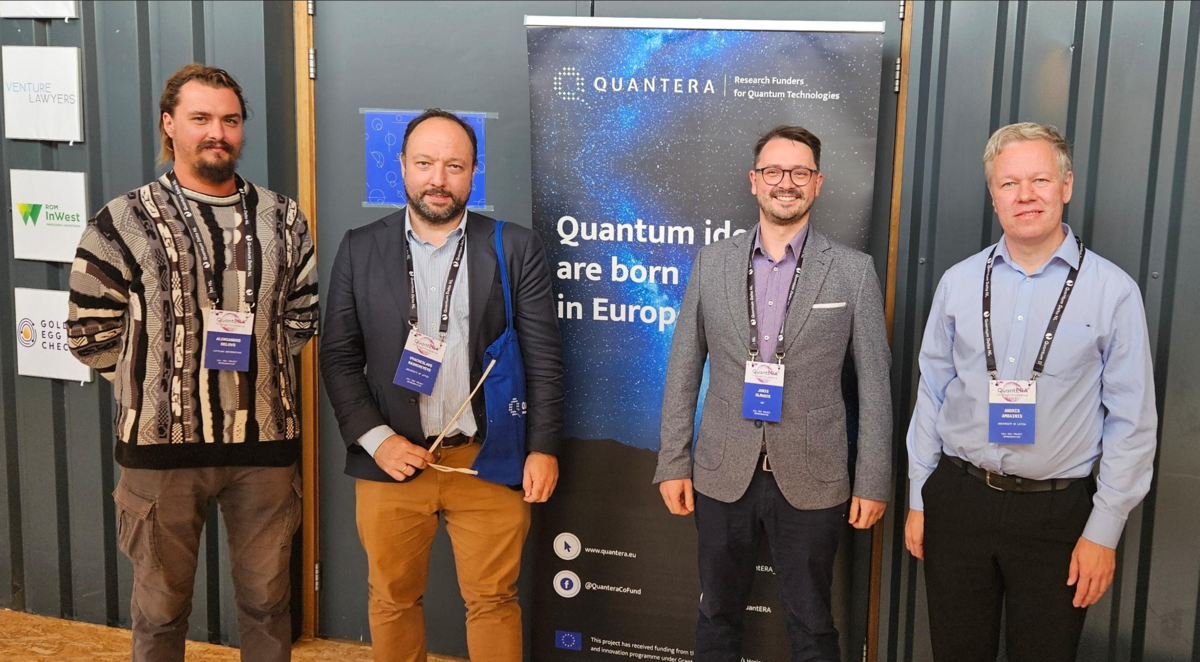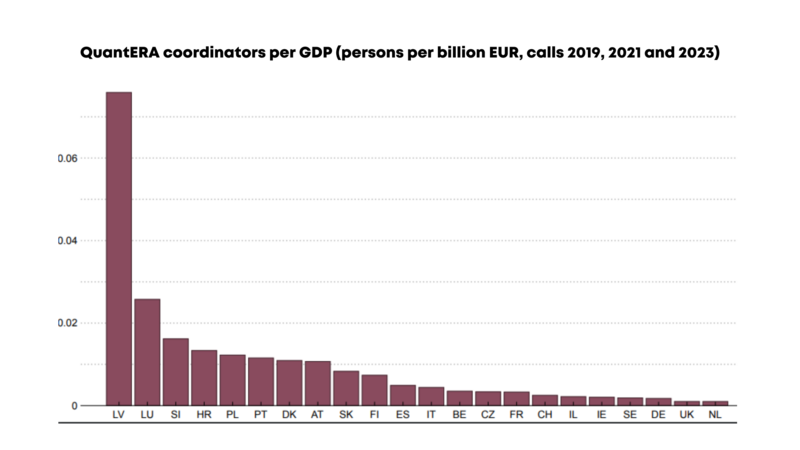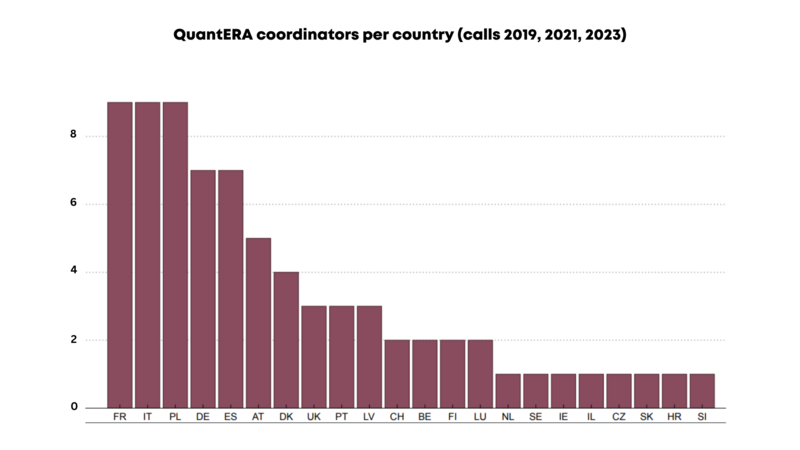

Andris Ambainis is the coordinator of the QuantERA-funded project “Hybrid Quantum Classical Computation”. The project started in 2022 and the consortium includes partners from Latvia, Germany, Hungary and Portugal. Aleksandrs Belovs coordinates the project “Quantum algorithms for optimization” which began in 2022 with partners from Latvia, Germany, Belgium and France. Vyacheslavs Kascheyevs is the coordinator of the project “Electronic Quantum Resources”, which started in May 2024 and the consortium is formed of Latvian, German and French scientists. All three projects take place at University of Latvia at the Faculty of Exact Sciences and Technologies.
Andris Ambainis also leads the teams that are partners to two more projects – the project “Quantum Computing Solutions for High-Energy Physics (QuantHEP)” (call 2019) and “Quantum algorithms and applications (QuantAlgo)” (call 2017). The group of Andrejs Cēbers at the same faculty is a partner to QuantERA 2021 call project “LEvitated MAgnets for QUantum Metrology (LEMAQUME)”.

Ongoing QuantERA Programme projects led by Latvian Quantum Initiative scientists
Electronic Quantum Resources (ElQuRes)
Call year 2023
Coordinator: Vyacheslavs Kashcheyevs (University of Latvia, Latvia)
The ambition of ELQURES is to contribute to the second quantum revolution in electronics by using coherent ballistic electrons and quantum states of electromagnetic resonators as resources for quantum-limited measurements and information processing. Established quantum technology platforms exploit the ability to generate, control and measure individual quantum excitations in a particular physical substrate which can vary from electromagnetic modes to atomic levels to spins of confined electrons. ELQURES brings the spotlight to a novel type of quantum resource and explores coherent propagating electrons as a source for non-classical states that can be efficiently manipulated electrically and integrated with other on-chip platforms. The scientific objectives of ELQURES are: (i) develop a unified framework for quantum tomography of electrical currents integrating different energy regimes and measurement principles; (ii) establish foundations for the control of coherent light-matter coupling between single to few electrons and electromagnetic fields with the aim of generating non-classical states of those field; (iii) demonstrate sources of coherent picosecond-scale wave-packets that enable all-electrical metrology of electrical signals with quantum resolution. The project brings together pioneers of solid-state electron quantum optics (ENS Paris and ENS Lyon) and leaders of single-electron technologies for fundamental electrical metrology (PTB, University of Latvia) that are uniquely positioned to unlock the potential of electronic coherence in the non-linear and the hot-electron regimes. The broader goal of ElQuRes is to advance the science of electron quantum optics to novel regimes and catalyze the emergence of single-electron quantum technologies with Europe in the leading role.
Learn more: https://quantera.eu/elqures/
Hybrid Quantum Classical Computation (HQCC)
Call year 2021
Coordinator: Andris Ambainis (University of Latvia, Latvia)
Hybrid quantum-classical computing combines the power of quantum and classical processors to compute faster. This is of particular relevance in the current Noisy Intermediate-Scale Quantum (NISQ) computing era, when quantum processors are still very limited. Moreover, hybrid computing bears the strongest potential for reaching a practical quantum advantage, as it will take a long time before fault-tolerant quantum computers completely replace classical machines, if ever. For these reasons, hybrid quantum-classical architectures have taken center stage in the recent heuristic exploration of the potential of quantum computers. A rigorous framework is, however, painfully lacking to date. The goal of project HQCC is to put this important field onto solid theoretical footing.
We aim to address the fundamental questions about the power of hybrid computation:
– What problems are more amenable to the hybrid quantum-classical approach?
– With what algorithms can we solve them?
– What data structures and encodings perform better under this approach?
– Can we classify how hard these problems are in this context, namely can we define hybrid quantum-classical computational complexity classes?
To address these questions, project HQCC is structured into three complementary parts: one dealing with complexity-theoretic aspects (such as the regimes in which quantum advantage is possible), one concerned with algorithms for hybrid computation (for example, variational quantum algorithms and the most efficient ways to encode data into them), and one dealing with learning and training processes. These three components will be developed in dialogue with each other to extract a comprehensive understanding of hybrid quantum-classical computation.
Learn more: https://quantera.eu/hqcc/
Quantum algorithms for optimization (QOPT)
Call year 2021
Coordinator: Aleksandrs Belovs (University of Latvia, Latvia)
Computational devices and closely-related information-processing technologies are among the most revolutionary inventions of the past century. Another groundbreaking discovery of the 20th century was quantum mechanics. The field of quantum computation stems from both of them. Its main objective is to understand how quantum mechanics changes our understanding of computation, especially the division between feasible and infeasible problems.
Recent developments in quantum algorithms indicates that various optimization problems can be solved much faster on a quantum computer. Optimization problems permeate our society, they are key for the efficient operation of industry, logistics, and for countless other tasks that are crucial to the functioning of our modern society. Also, optimization problems are notoriously hard, and solving many of them precisely is out of reach of the most powerful modern computers even for modestly-sized instances.
The aim of this project is to push the use of quantum computers for optimization tasks much further, developing new quantum algorithms which go well beyond the capability of even the best classical computers we have today. We aim at both general-purpose algorithms that can be used for a large variety of applications as well as more application-focused algorithms. We consider both continuous and discrete optimization, quantum algorithms for mixed-integer programs, as well as applications for machine learning, logistics, big data and physics. Our approach includes recent and exciting developments like quantum dynamic programming and graph sparsification. We are also interested in studying the QAOA-type algorithms, which can be executed even on really small quantum computers like the ones available today.
Learn more: https://quantera.eu/qopt/

 CONFERENCE
CONFERENCE